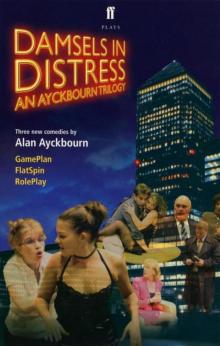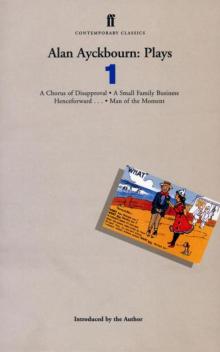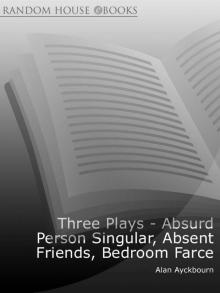- Home
- Alan Ayckbourn
Three Plays
Three Plays Read online
CONTENTS
Cover
About the Book
About the Author
Title Page
Preface
1 ABSURD PERSON SINGULAR
Act One
Act Two
Act Three
2 ABSENT FRIENDS
Act One
Act Two
3 BEDROOM FARCE
Act One
Act Two
The History of Vintage
Copyright
About the Book
In Three Plays Ayckbourn’s darkly comic, perfectly pitched dialogue slices into the soul of suburbia. The settings are simple – a kitchen, a bedroom, a party – where couples meet, bewildered, puzzled and angry. The fraught relationships between men and women are exposed with humour, bathos and a sharp understanding of human nature.
About the Author
Born in London in 1939, Alan Ayckbourn is one of Britain’s most popular and prolific playwrights. He has written 74 full length plays and more than 20 other revues and plays for children. Alan Ayckbourn was awarded a CBE in 1987. Ten years later he was knighted by Queen Elizabeth II ‘for services to the theatre’.
ALAN AYCKBOURN
Three Plays:
Absurd Person
Singular,
Absent Friends,
Bedroom Farce
PREFACE
Absurd Person Singular – the title was originally intended for a play I didn’t write and subsequently, because I rather cared for it, given to the play I did write – was first produced in Scarborough in 1972.
At that time, I remember, I was becoming increasingly fascinated by the dramatic possibilities of offstage action. Not a new device, granted, but one with plenty of comic potential still waiting to be tapped. Very early on in my career as a dramatist I discovered that, given the chance, an audience’s imagination can do far better work than any number of playwright’s words. The offstage character hinted at but never seen can be dramatically as significant and telling as his onstage counterparts. Offstage action is more difficult. Unless care is taken, if the dramatist chooses to describe rather than show his action, the audience can rapidly come to the conclusion that they’re sitting in the wrong auditorium.
Thus, when I came to write Absurd Person and started by setting the action in Jane and Sidney Hopcroft’s sitting room, I was halfway through the act before I realised that I was viewing the evening from totally the wrong perspective. Dick and Lottie were indeed monstrously overwhelming, hearty and ultimately very boring, and far better heard occasionally but not seen. By a simple switch of setting to the kitchen, the problem was all but solved, adding incidentally far greater comic possibilities than the sitting room ever held. For in this particular case, the obvious offstage action was far more relevant than its onstage counterpart.
As a footnote: since I was writing about parties and guests arriving, it also relieved me of the tedium of all that hallo-how-are-you-goodbye-nice-to-see-you business.
Absurd Person, then, could be described as my first offstage action play. It is also, some critics have observed, a rather weighty comedy. Its last scene darkens considerably. I make no apologies for this. As I’ve grown in confidence as a dramatist (confidence, that is, that I can get most of the techniques right most of the time), I have also grown in the conviction that I owe it to the characters I’ve created to develop and therefore to a certain extent to dictate how a play should run.
I’ve always had an aversion to comedies that rely upon natty, superimposed denouements in order to round off the evening. Why comedies should have to do this whereas dramas are allowed to finish as they like is beyond me. As a nation, we show a marked preference for comedy when it comes to playgoing, as any theatre manager will tell you. At the same time, over a large area of the stalls one can detect a faint sense of guilt that there is something called enjoyment going on. Should we, people seem to be asking, be sitting here laughing like this? It’s to do with the mistaken belief that because it’s funny, it can’t be serious – which of course isn’t true at all. Heavy, no; serious, yes. It would therefore seem unwise to compound this guilt feeling by artificially resolving the play. In other words, it can be funny, but let’s make it truthful.
Absent Friends, first produced in Scarborough in 1974, followed The Norman Conquests, which to all intents and purposes was the end of my exploration of offstage action. Three plays, two of which were happening offstage simultaneously with the one onstage, were quite enough. Absent Friends was almost a drawing-in of forces. It was significant for me in several ways. Its use of time, for one. The stage action matches real time almost second for second. Most plays have their own time span where hours or months can pass quite happily in the space of minutes. Absent Friends’ time span, being what it is, had the intended consequence of making the play far more claustrophobic, almost oppressive.
Its single set, its small detailed action, helped. It is a play for a small intimate theatre where one can hear the actors breathing and the silences ticking away. It was a terrifying risk when it was first produced. I’d never pitched anything in quite such a low key before.
Following this (with only the five short plays entitled Confusions between them) came the far more robust Bedroom Farce. This play has, I think, elements of both Absurd Person and Absent Friends in it. It has its moments of near farce and yet still contains elements of the claustrophobic – maybe because it’s all in bedrooms. It is also the first time I’ve made use, to quite such an extent, of the cross-cut device. Jumping the action from bedroom to bedroom gives the play an added rhythm over and above what the dialogue normally provides. Again, I’ve allowed the characters to progress, develop and resolve very much in their own way. Perhaps, as in my other plays, none of them finds instant happiness or sudden great self-insight. But at least they retain the dignity of resolving their own destinies.
Alan Ayckbourn
Scarborough 1976
ABSURD PERSON SINGULAR
First produced at the Library Theatre, Scarborough, in June 1972 and subsequently by Michael Codron at the Criterion Theatre, London, on the 4th July 1973, with the following cast:
The play directed by Eric Thompson
Settings by Alan Tagg
Act I Sidney and Jane’s Kitchen. Last Christmas
Act II Geoffrey and Eva’s Kitchen. This Christmas
Act III Ronald and Marion’s Kitchen. Next Christmas
ACT ONE
SIDNEY and JANE HOPCROFT’s kitchen of their small suburban house. Last Christmas
Although on a modest scale, it is a model kitchen. Whilst not containing all the gadgetry, it does have an automatic washing machine, a fridge, an electric cooker and a gleaming sink unit. All these are contained or surrounded by smart formica-topped working surfaces with the usual drawers and cupboards. The room also contains a small table, also formica-topped, and matching chairs.
When the CURTAIN rises, JANE, a woman in her thirties, is discovered bustling round wiping the floor, cupboard doors, working surfaces–in fact, anything in sight–with a cloth. She sings happily as she works. She wears a pinafore and bedroom slippers, but, under this, a smart new party dress. She is unimaginatively made up and her hair is tightly permed. She wears rubber gloves to protect her hands.
As JANE works, SIDNEY enters, a small dapper man of about the same age. He has a small trimmed moustache and a cheery, unflappable manner. He wears his best, rather old-fashioned, sober suit. A dark tie, polished hair and shoes complete the picture.
SIDNEY: Hallo, hallo. What are we up to out here, eh?
JANE: [without pausing in her work] Just giving it a wipe.
SIDNEY: Dear oh dear. Good gracious me. Does it need it? Like a battleship. Just like a battleship
. They need you in the Royal Navy.
JANE: [giggling] Silly …
SIDNEY: No–the Royal Navy.
JANE: Silly …
[SIDNEY goes to the back door, turns the yale knob, opens it and sticks his hand out]
SIDNEY: Still raining, I see.
JANE: Shut the door, it’s coming in.
SIDNEY: Cats and dogs. Dogs and cats. [He shuts the door, wiping his wet hand on his handkerchief. Striding to the centre of the room and staring up at his digital clock] Eighteen-twenty-three. [Consulting his watch] Eighteen-twenty-three. Getting on. Seven minutes – they’ll be here.
JANE: Oh. [She straightens up and looks round the kitchen for somewhere she’s missed]
SIDNEY: I’ve got a few games lined up.
JANE: Games?
SIDNEY: Just in case.
JANE: Oh good.
SIDNEY: I’ve made a parcel for “Pass the Parcel”, sorted out a bit of music for musical bumps and thought out a few forfeits.
JANE: Good.
SIDNEY: I’ve thought up some real devils. [He puts his leg on the table]
JANE: I bet. [She knocks his leg off, and wipes]
SIDNEY: Just in case. Just in case things need jollying up. [Seeing JANE still wiping] I don’t want to disappoint you but we’re not going to be out here for our drinks, you know.
JANE: Yes, I know.
SIDNEY: The way you’re going …
JANE: They might want to look …
SIDNEY: I doubt it.
JANE: The ladies might.
SIDNEY: [chuckling knowingly] I don’t imagine the wife of a banker will particularly choose to spend her evening in our kitchen. Smart as it is.
JANE: No?
SIDNEY: I doubt if she spends very much time in her own kitchen. Let alone ours.
JANE: Still …
SIDNEY: Very much the lady of leisure, Mrs Brewster-Wright. Or so I would imagine.
JANE: What about Mrs Jackson?
SIDNEY: [doubtfully] Well–again, not a woman you think of in the same breath as you would a kitchen.
JANE: All women are interested in kitchens. [She turns to the sink]
SIDNEY: [ironically] Oh, if you’re looking for a little job …
JANE: What’s that?
SIDNEY: A small spillage. My fault.
JANE: [very alarmed] Where?
SIDNEY: In there. On the sideboard.
JANE: Oh, Sidney. [She snatches up an assortment of cloths, wet and dry]
SIDNEY: Nothing serious.
JANE: Honestly.
[Sidney goes to the back door, opens it, sticks a hand out]
SIDNEY: Dear oh dear. [He closes the door and dries his hand on his handkerchief]
JANE: [returning] Honestly.
SIDNEY: Could you see it?
JANE: You spoil that surface if you leave it. You leave a ring. [She returns her dish cloth to the sink, her dry cloths to the drawer and now takes out a duster and a tin of polish] Now that room’s going to smell of polish. I had the windows open all day so it wouldn’t.
SIDNEY: Well then, don’t polish.
JANE: I have to polish. There’s a mark. [She goes to the door and then pauses] I know, bring the air freshener.
SIDNEY: Air freshener?
JANE: Under the sink.
[JANE exits]
SIDNEY: Ay, ay, Admiral. [He whistles a sailor’s horn-pipe, amused] Dear oh dear. [He opens the cupboard under the sink, rummages and brings out an aerosol tin. He is one of those men who like to read all small print. This he does, holding the tin at arm’s length to do so. Reading] “Shake can before use.” [He does so. Reading] “Remove cap.” [He does so. Reading] “Hold away from body and spray into air by depressing button.” [He holds the can away from his body, points it in the air and depresses the button. The spray hisses out over his shirt front] Dear oh dear [He puts down the tin, wipes his shirt-front with a dishcloth]
[JANE enters]
JANE: What are you doing?
SIDNEY: Just getting this to rights. Just coming to terms with your air freshener.
JANE: That’s the fly spray.
SIDNEY: Ah.
JANE: Honestly. [She takes the canister from him and puts it on top of the washing machine]
SIDNEY: My mistake.
JANE: For someone who’s good at some things you’re hopeless.
SIDNEY: Beg your pardon, Admiral, beg your pardon.
[JANE puts away the duster and polish]
[Checking his watch with the clock] Four and a half minutes to go.
JANE: And you’ve been at those nuts, haven’t you?
SIDNEY: Nuts?
JANE: In there. In the bowl. On the table. Those nuts. You know the ones I mean.
SIDNEY: I may have had a little dip. Anyway, how did you know I’d been at those nuts? Eh? How did you know, old eagle-eye?
JANE: Because I know how I left them. Now come on, out of my way. Don’t start that. I’ve got things to do.
SIDNEY: [closing with her] What about a kiss then?
JANE: [trying to struggle free] Sidney …
SIDNEY: Come on. Christmas kiss.
JANE: Sidney. No, not now. What’s the matter with you? Sidney … [She pauses, sniffing]
SIDNEY: What’s the matter now?
JANE: What’s that smell?
SIDNEY: Eh?
JANE : It’s on your tie. What’s this smell on your tie?
[They both sniff his tie]
There. Can you smell?
SIDNEY: Oh, that’ll be the fly spray.
JANE: Fly spray?
SIDNEY: Had a bit of a backfire.
JANE: It’s killed off your after-shave.
SIDNEY: [jovially] As long as it hasn’t killed off my flies, eh.
[He laughs]
[JANE laughs]
[Suddenly cutting through this] Eighteen-twenty-eight. Two minutes.
JANE: [nervous again] I hope everything’s all right.
SIDNEY: When?
JANE: For them. I want it to be right.
SIDNEY: Of course it’s right.
JANE: I mean. I don’t want you to be let down. Not by me. I want it to look good for you. I don’t want to let you down …
SIDNEY: You never have yet …
JANE: No, but it’s special tonight, isn’t it? I mean, with Mr and Mrs Brewster-Wright and Mr and Mrs Jackson. It’s important.
SIDNEY: Don’t forget Dick and Lottie Potter. They’re coming, too.
JANE: Oh, well, I don’t count Dick and Lottie. They’re friends.
SIDNEY: I trust by the end of this evening, we shall all be friends. Just don’t get nervous. That’s all. Don’t get nervous. [He consults the clock and checks it with his watch] One minute to go.
[A slight pause. The front door chimes sound]
What was that?
JANE: The front door.
SIDNEY: They’re early. Lucky we’re ready for them.
JANE: Yes. [In a sudden panic] I haven’t sprayed the room.
SIDNEY: All right, all right. You can do it whilst I’m letting them in. Plenty of time.
JANE: It doesn’t take a second.
[JANE snatches up the air freshener and follows SIDNEY out into the sitting-room. A silence. JANE comes hurrying back into the kitchen]
[JANE puts away the air freshener, removes her pinny, straightens her clothing and hair in the mirror, creeps back to the kitchen door and opens it a chink. Voices are heard–SIDNEY’s and two others. One is a jolly hearty male voice and one a jolly hearty female voice. They are DICK and LOTTIE POTTER, whom we have the good fortune never to meet in person, but quite frequently hear whenever the door to the kitchen is open. Both have loud, braying distinctive laughs. JANE closes the door, cutting off the voices, straightens her hair and dress for the last time, looks at a mirror on the wall, grips the door handle, takes a deep breath, is about to make her entrance into the room when she sees she is still wearing her bedroom slippers]
Oh.
&
nbsp; [She takes off her slippers, puts them on the table and scuttles round the kitchen looking for her shoes. She cannot find them. She picks up the slippers and wipes the table with their fluffy side, where they have made a mark]
Oh.
[She hurries back to the door, opens it a fraction. Jolly chatter and laughter is heard. JANE stands for a long time, peeping through the crack in the door, trying to catch sight of her shoes. She sees them. She closes the door again. She stands lost]
Oh. Oh. Oh.
[The door opens. Loud laughter from off. SIDNEY comes in laughing. He closes the door. The laughter cuts off abruptly]
SIDNEY: [fiercely, in a low voice] Come on. What are you doing?
JANE: I can’t.
SIDNEY: What?
JANE: I’ve got no shoes.

 Damsels in Distress
Damsels in Distress Alan Ayckbourn Plays 1
Alan Ayckbourn Plays 1 Three Plays
Three Plays